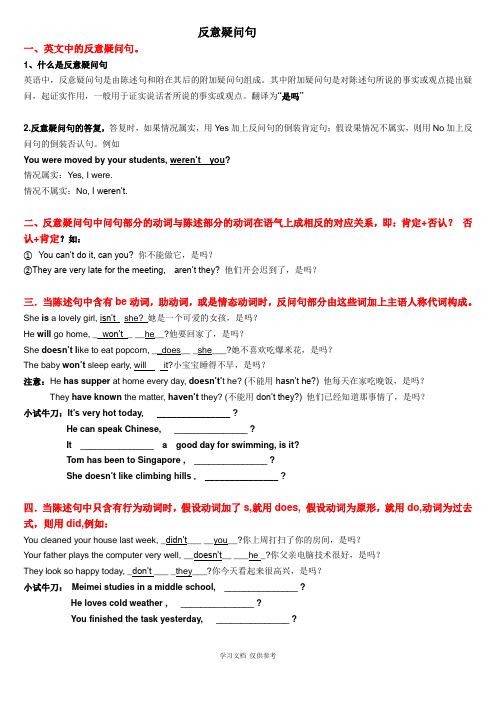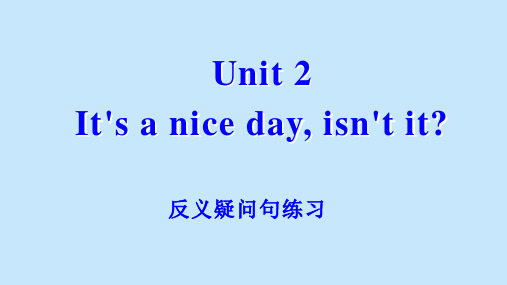英语反义疑问句课件加练习
英语反义疑问句课件加练习

isn’t he ? 1)Tom is a worker, isn’t Tom?(找错)_______ can’t you 2)You can swim, can not you?(找错)______ ? didn’t he ? 3)He had lunch, doesn’t he?(找错)________
8. Let’s的反意疑问句shall we
• • • •
shall we Let’s have a rest, _____________? (包括听话者) will you Let us have a rest, _____________? (不包括听话者)
8 You have never been to Beijing ,___________? have you 9 He didn’t say anything about your mistakes, did he __________? 10 Tom can swim very well, __________? can’t he 11 All of your friends will come to your party, ___________? won’t they 12 There is a pen on the chair,___________? isn’t there 13 There is nothing in the fridge,_____________? is there 14 There will be a paper factory near my home in about won’t there 2 years,__________? will you 15 Open your books, ____________? will you 16 Don’t go across the road now, ___________? shall we 17 Let’s wait ,__________? 18 Let us have a rest, _____________? will you
反义疑问句练习PPT(1)

完成下列反意疑问句
(1)You’re a farmer, __a_r_e_n_’_t ___y_o_u___? (2)The weather isn’t fine, __i_s___ __it___? (3)Kate came here last month, _d_id__n_’t __s_h_e__? (4)I don’t think Tom is at home, ___is__ _h_e___? (5)There weren’t enough nuts, _w_e_r_e_ _th_e_r_e_? (6)There’s a pen in the pencil-box, _is_n_’_t _th__e_re_? (7)The man had bread for lunch, _d_i_d_n_’_t _h_e__? (8)Mary can speak little English , __c_a_n_ __s_h_e__? (9)Nothing is wrong with the watch, __i_s_ __it___?
英语反义疑问句课件加练习

Use antonyms to express contrasting ideas or opinions
Incorrect usage of tense and aspect
Students may use the wrong tense or aspect of a verb, so as using the present perfect act of the past simple
Incorrect use of positions
Detailed description
A simple sentence refers to a sentence that contains only one subject and one predicate. This type of sentence has a simple structure and is easy to understand, making it one of the most basic sentence types in English. When asking questions about opposition, simple sentences can be used to express it. For example, "Is the sky blue or black?"
Tag questions
03
A short question added to the end of a statement to turn it into a question Example: "You're from New York, aren't you?"
反义疑问句讲解和练习(答案)

反意疑问句一、英文中的反意疑问句。
1、什么是反意疑问句英语中,反意疑问句是由陈述句和附在其后的附加疑问句组成。
其中附加疑问句是对陈述句所说的事实或观点提出疑问,起证实作用,一般用于证实说话者所说的事实或观点。
翻译为“是吗”2.反意疑问句的答复,答复时,如果情况属实,用Yes加上反问句的倒装肯定句;假设果情况不属实,则用No加上反问句的倒装否认句。
例如You were moved by your students, weren’t you?情况属实:Yes, I were.情况不属实:No, I weren’t.二、反意疑问句中问句部分的动词与陈述部分的动词在语气上成相反的对应关系,即:肯定+否认?否认+肯定?如:①You can’t do it, can you? 你不能做它,是吗?②They are very late for the meeting, aren’t they? 他们开会迟到了,是吗?三.当陈述句中含有be动词,助动词,或是情态动词时,反问句部分由这些词加上主语人称代词构成。
She is a lovely girl, isn’t she? 她是一个可爱的女孩,是吗?He will go home, __won’t__ __he__?他要回家了,是吗?She doesn’t l ike to eat popcorn, __does__ _she___?她不喜欢吃爆米花,是吗?The baby won’t sleep early, will it?小宝宝睡得不早,是吗?注意:He has supper at home every day,doesn’t’t he? (不能用hasn’t he?) 他每天在家吃晚饭,是吗?They have known the matter, haven’t they? (不能用don’t they?) 他们已经知道那事情了,是吗?小试牛刀:It’s very hot today, _______________ ?He can speak Chinese, _______________ ?It _______________ a good day for swimming, is it?Tom has been to Singapore , _______________ ?She d oesn’t like climbing hills , _______________ ?四.当陈述句中只含有行为动词时,假设动词加了s,就用does, 假设动词为原形,就用do,动词为过去式,则用did,例如:You cleaned your house last week, _didn’t___ __you__?你上周打扫了你的房间,是吗?Your father plays the computer very well, __doesn’t__ ___he _?你父亲电脑技术很好,是吗?They look so happy today, _don’t ___ _they___?你今天看起来很高兴,是吗?小试牛刀:Meimei studies in a middle school, _______________ ?He loves cold weather , _______________ ?You finished the task yesterday, _______________ ?五.反意疑问句的陈述部分带有little, few, never, hardly, seldom,nobody, nothing, barely, scarcely 等否认意义的词时,问句部分用肯定式。
反义疑问句讲解与练习

反义疑问句讲解与练习一、含be(is, are, was, were)动词的反意疑问句(1)句型1:主语+ be+其它,isn’t(aren’t, wasn’t, weren’t)+ 主语?句型2:主语+ be not+其它,is(are, was, were) + 主语?① You are from America, aren’t you? Yes, I am. No, I’m not.② It isn’t very cold today, is it? Yes, it is. No,it isn’t.(2)注意:There be句型例:There is an old picture on the wall, isn’t there?二、带行为动词反意疑问句(不含be和情态动词)句型1:主语+动词+其他,do/did/does + not +主语?句型2:主语+did/does/do+not +动词原形+其他,did/do/does+其他?例:You often watch TV in the evening, don’t you? Yes, I do. No, I don’t.三、含有情态动词的反意疑问句,反义疑问句中的动词使用情态动词。
例:The students must study hard, mustn’t they? Yes, they must. No, they needn’t.注意:You must go home now, needn’t you? Yes, I must. No, I needn’t.★注意:There be句型的一般将来时① There will be a basketball match tomorrow, won’t there?Yes, there will. No, there won’t.② There won’t be too much pollution in the future, will there?Yes, there will. No, there won’t.四、反义疑问句的回答:答语要和实际情况相符合,遵循“实事求是”的原则。
反义疑问句讲解及练习题

反义疑问句讲解及练习题1.祈使句。
祈使句后一般加上will you或won't you构成反意疑问句,用will you 多表示“请求”,用won't you 多表示提醒对方注意。
例如:Look at the blackboard, will you/ won't you?看黑板,好吗?Let引导的祈使句有两种情况:1)Let's...,后的反意疑问句用shall we或shan't we。
例如:Let's go home, shall we/ shan't we? 回家吧,好吗?还可以用may I来表示征求对方的同意或许可。
2)Let us/me...后的反意疑问句用will you 或won't you。
例如:Let me have a try, will you/won't you? 让我试一试,行吗?2.感叹句。
感叹句后加反意疑问句时,其反意疑问句需用be的一般现在时态的否定形式。
例如:What fine weather, isn't it? 多好的天气啊,是吧?3. 当陈述部分谓语动词是need, dare, used to,且这些词被用作实义动词时,其反意疑问句需用do的适当形式。
例如:He needs help, doesn't he?他需要帮助,是吗?4.陈述部分主、谓语是I am...时,反意疑问句用aren't I 或ain't I ,而不是am not I (可用am I not)。
例如:I'm working now, ain't I? 我在工作,是吗?5.陈述部分的主语是everything, nothing, anything或something 时,反意疑问句的主语应用代词it。
例如:Something is wrong with my radio, isn't it? 我的收音机出毛病了,是吧?6.陈述部分的主语是 everybody, everyone, anybody, anyone, somebody, someone, nobody, no one, none, neither 时, 其反意疑问句的主语需用复数代词they。
中考英语-反义疑问句PPT(共46张PPT)

A.目的:我们使用反义疑问句来确认某件事是否是真实的, 或者期望得到对方的肯定回答。
B.构成:陈述部分+附加疑问部分
C.规则: 1.附加疑问部分构成: 由谓语动词的正确形式(be,do ,情态动词)+主格代词 (he,they,it等) 2.时态 陈述部分与附加疑问部分时态保持一致
3) 关于陈述部分的主语和疑问 部分的主语一致问题
陈述部分主语
不定代词everyone,no one, nobody everything,anything,nothing,som ething, this,that one
疑问部 分主语
he/they
it one/he
例句
Everyone is in the classroom, aren't they? Everything goes well, does it? This is your book, isn't it? One can't be always young,can one?
now,_________? 4.It's a nice day,______? 5.Arthur is responsible for the newspaper, ____? 6.Alice has never seen a three-D movie at the cinema,
_______?
动词 + there
There are some apples in the basket, aren't there? There isn't any milk left, is there?
反义疑问句(共14张PPT)全

二、前否+后肯
1.She wasn’t ill last week, was she ? 2.It doesn’t often rain here, does it? 3.Tom won’t go to Shanghai next year,
will he ?
特殊用法1—祈使句的反义疑问句
1、肯定祈使句的反意疑问句,疑问部分用will you或won’t you,否定祈使句则用will you ? 如: Don't do that again, will you? Go with me, will you / won't you?
13、He who seize the right moment, is the right man.谁把握机遇,谁就心想事成。2024/10/172024/10/172024/10/172024/10/1710/17/2024 +14、谁要是自己还没有发展培养和教育好,他就不能发展培养和教育别人。2024年10月17日星期四2024/10/172024/10/172024/10/17 +15、一年之计,莫如树谷;十年之计,莫如树木;终身之计,莫如树人。2024年10月2024/10/172024/10/172024/10/1710/17/2024 +16、教学的目的是培养学生自己学习,自己研究,用自己的头脑来想,用自己的眼睛看,用自己的手来做这种精神。2024/10/172024/10/17October 17, 2024 +17、儿童是中心,教育的措施便围绕他们而组织起来。2024/10/172024/10/172024/10/172024/10/17
一 、前肯+后否 含be动词
1.He is a doctor, isn’t he? 2.I am Chinese, aren’t I?
高中英语复习 反义疑问句 (共27张PPT)

4. 完成时的反意疑问句
主语+have/has+过去分词…, haven’t (hasn’t) + 主语? He has been to America, hasn’t he ? Marry hasn’t lived in the countryside, has she ? You haven’t been to Shanghai, have you ?
简单句的反义疑问句
1.含有be动词(is, are, was, were)的句型: 现在: 主语+is (are)…, isn’t (aren’t) + 主语? 过去: 主语+was (were)…,wasn’t (weren’t) + 主语? are you You are not students, _______? The students are going to have a picnic,_______________ aren’t they ? were they ? The Greens weren’t at home last night, ______________
反意疑问句的解答步骤
1. 判定(判断该用肯定还是否定); 2. 找动(确定句子的助动词类型或情态动词:be、do 和完成have的适当形式以及情态动词的形式); 3. 换代(将主语换为代词);
Jack wasn’t playing soccer, ____ was ___? he Their parents have gone to London, haven’t they ___________? have I___? I have never been to the park, ____ don’t you You have a good friend, ______ ____? didn’t ____? we We had a meeting, _____
Unit 2.反义疑问句讲解及练习pptx

注意以下几种特殊情况
1.若陈述部分含有hardly, never, few, nothing, little, nobody, seldom等否定词 或半否定词,其疑问部分要用肯定式:
They said nothing, did they? 2.若陈述部分含有带否定前缀的词,疑问部分仍用否定式:
It is unfair, isn’t it? 3.当陈述部分为为there be 句型时,疑问部分仍用there作“主语”:
Unit 2 It's a nice day, isn't it?
反义疑问句练习
反 意 疑 问 句 : 表示说话人对所陈述的事情有所怀疑或不确
定,想通过对方的答语加以肯定或否定。在一个陈述句之后附上 一个简短的疑问句,对陈述句提出相反的疑问,这种疑问句叫反 意疑问句。
构成原则:
1. 主语、时态一致
17. There will be no rain tomorrow ,____w_i_ll__th_e_r_e? 18. My father never went to Xi’an ,____d_i_d__h_e__? 19.Nothing can stop him learning English ,_c_a_n___it_? 20. Something is wrong with your computer ,_i_s_n_’t__it? 21. everyone is here ,___i_s_n_’t__h_e__? 22. Don’t be late for class ,____w__il_l _y_o_u_? 23. Let’s go to the cinema ,____s_h_a_l_l _w_e_? 24. Let us go out for a walk ,____w__ill__y_o_u_?
中考英语复习反意疑问句课件(共28张PPT)

他的父亲是个工人,不是吗?
【记忆口诀】
前肯后否是习惯,前否后肯也常见;
句尾not如出现,必须缩写是习惯; 人称代词作主语,这点一定记心间。
(2)反意疑问句的答语 反意疑问句要根据事实来回答,反意疑问句 的答语要用Yes或No,注意时态和人称代词 的呼应。 “前否后肯”反意疑问句中的答 语与汉语习惯有所不同。如: . —Mary likes eating fish, doesn't she? —玛丽喜欢吃鱼,不是吗? —Yes, she does. —是的,她喜欢。 —No,she doesn't.—不,她不喜欢。
仍然要用there。
7)当陈述句是不定代词one作主语时,附加 疑问部分的语在正式场合用one,在非正式
场合也可用 you。
One must study hard, mustn't one/ mustn't
you? 一个人应该努力学习,对吗?
8)当陈述句的主语为each of...结构时,表示
“个别的,各个”之意时,其附加疑问句
每二十分钟有一班火车,是吗?
There will be a meeting tomorrow, won't there? 明天将有一个会议,是吗? 5)当陈述句的主语是表示人的不定代词 someone,somebody,everyone, everybody,
nobody等时,附加疑问句的主语用they或he.
10)当陈述句带有no,never,nothing, nobody,no one,nowhere,few,little, seldom,hardly等表示否定意义的词时;附 加疑句用肯定形式。 There is no milk in the botde, is there? 瓶子里没有牛奶,是吗? You have never been to London,have you? 你从来没有去过伦敦,是吗? Few people were late for work yesterday,were they? 昨天上班没有人迟到,是不是?
中考英语复习专题反义疑问句课件(共32张PPT)

后
肯
1、简短问句的 主语用人称代词,不用名 词,并要与陈述句的 主语保持一致,同时 前后两部分的助动词、情态动词、动词在 人称、数、时态上要保持一致。
Tom is a good boy , isn’t he ? Tom is a good boy ,isn’t Tom ?
×
×
2、否定疑问句中的not要采用缩写形式
aren’t they They are good at singing , ___________?
Yes, they are.
They sang songs in GZ yesterday, didn’t _________? they No, they didn’t. They come from China, _________? don’t they Yes, they do.
1. 陈述部分的主语是this, that 或v.ing时, 疑问部分的主语多用it;陈述部分的主语是 these, those时,疑问部分的主语多用they。 This is a dictionary,_______ isn’t it? Those are sheep, ________ aren’t they?
It’s cold in the picture,___________? isn’t it Yes,it is.
不论怎样提问,若事实是肯 定的,就用yes回答;若事 实是否定的,就用no回答
do they They don’t like swimming,_________? Yes,they do. 不,他们喜欢
一般情况:肯定句+否定疑问句
前 肯 后 否
否定句+肯定疑问句
前否
后 肯
(完整版)反意疑问句精讲及专项练习(含答案)

反意疑问句在陈述句之后,附加一个简短问句,对陈述部分所述事实或观点提出疑问,叫反意疑问句。
附加问句的谓语动词及主语的形式均须与陈述部分保持一致,且主语必须用人称代词。
反意疑问句须遵循“前肯后否、前否后肯”的原则。
在中考题中,反意疑问句主要考查不同情况下专项练习:1. Tell me how to solve this problem, ____?A. do youB. don't youC. will youD. shan't you2. Half an hour ought to be enough time, ____?A. shouldn't itB. didn't theyC. oughtn't half an hourD. shouldn't half an hour3. They have to go to school now, ____?A. haven't theyB. don't theyC. hadn't theyD. did they4. When the car crashed, your brother escaped being hurt, ____?A. did itB. didn't itC. didn't heD. did he5. I'm dirty, ____?A. am IB. isn't IC. aren't ID. am not I6. That's the sort of the book you want, ____?A. is thatB. isn't itC. is itD. isn't that7. I suppose you're not leaving, ____?A. are youB. don't youC. do youD. aren't you8. I wish to shake hands with you, ____?A shall I B. may IC. do ID. will I9. AIl these dictionaries are a great help to you, ____?A. aren't all theseB. are all these dictionariesC. aren't theyD. are they dictionaries10. The film that we saw last week was quite amazing, ____?A. was itB. wasn't itC. weren't weD. didn't we11. He has been writing letters all afternoon, but he should have finished them by now, ____?A. shouldn't heB. didn't youC. hasn't heD. has he12. We'd rather stay at home tonight, ____?A. isn't itB. hadn't weC. wouldn't weD. won't we13. There appeared to be no better way, ____?A. didn't thereB. were thereC. did thereD. was there14. You had some trouble finding where I live, ____?A. do IB. hadn't youC. didn't youD. don't I15. He has his hair cut every month, ____?A. has heB. hasn't heC. does heD. doesn't he16. Jim told me that he would take a trip to Britain, ____?A. would heB. wouldn't heC. did heD. didn't he17. Jimmy dare not go to church, ____?A. does heB. dare heC. daren't heD. doesn't he18. She would have worked abroad if she'd had the chance, ____?A. wouldn't sheB. would sheC. hadn't sheD. has she19. Everyone is enjoying themselves, ____?A. aren't theyB. isn't everyoneC. does heD. is he20. Anyone can have a meal here, ____?A. can theyB. can't anyoneC. can't theyD. can anyone21. Your friend needs to come earlier, ____?A. need heB. needn't heC. does heD. doesn't he22. Jenny scarcely comes to visit you, ____?A. does sheB. doesn't sheC. do youD. don't you23. Let's listen to the radio program that the teacher mentioned, ____?A. don't weB. do weC. shall weD. shan't we24. The teacher had a talk with you, ____?A. has youB. hadn't sheC. did sheD. didn't she25. You think you're funny, ____?A. do youB. are youC. don't youD. didn't you26. Janet used to take part in labor in that village, ____?A. used sheB. did sheC. didn't sheD. should she27. What a beautiful flower, ____?A. doesn't itB. isn't itC. won't itD. is it28. No one will believe how difficult his work has been, ____?A. will heB. won't nobodyC. will theyD. won't they29. You must have made the mistake, ____?A. mustn't youB. haven't youC. didn't youD. hadn't you30. Learning how to repair computers takes a long time, ____?A. isn't itB. aren't theyC. doesn't itD. don't they31. Tom has milk with breakfast, ____?A. hasn't TomB. hasn't heC. doesn't TomD. doesn't he32. They must have stayed at hotel last night, ____?A. mustn't theyB. haven't theyC. didn't theyD. hadn't they33. Something'll have to be done about the air pollution, ____?A. won't itB. will itC. has itD. does it34. You must be hungry, ____?A. must youB. mustn't youC. are youD. aren't you35. She had the clothes cleaned, ____?A. had sheB. hadn't sheC. didn't sheD. didn't her daughter36. There isn't anything wrong with the car, ____?A. is thereB. is itC. does itD. does there答案:1-5 CABCC 6-10 BABCB 11-15 ACCBD 16-20 DBAAC 21-25 DACDC 26-30 CBABC 31-36 DCADCA。
初中英语反义疑问句专项练习PPT课件

--- Let's ... + shall we 或 shan't we ?
.
7
13. ——The boy has to stay at home to look
after his little sister, __C______?
— Yes, because his mother has gone shopping.
no , no one ,nobody , nothing , none , neither 等 ,反问句应
用肯定结构。
8. The lady couldn't say a word when she saw the snake,
C ________?
(A) could the lady (B) couldn't the lady
初中反义疑问句练习与讲解
2018.11
.
1
1.Few of them hurt themselves in the accident last night,
C __________?
(A) don't they (B) didn't they (C) did they (D) do they
-----陈述部分含有 few , little , seldom , hardly , never , not ,
--陈述部分用 " There be + 主语 " 句式 ,反问句用 there 作
主语 。
12. ——Let's go and play football, __D____?
——That's wonderful.
(A) will you
最新中考复习--反义疑问句(共30张PPT)教育课件

A. 含be(is, are, was, were)
1.---You are from America, aren’t you? ---Yes, I am. /No, I’m not.
2. ---The Green weren’t at home last night, were they?
弄
五
分
钟
就
弄
完
所
以
最
后
通
常
变
成
我
自
己
弄
。
但
这
样
做
有
一
个
不
好
的
后
果
就
是
当
你
真
–
■
电
:
“
色
情
男
女
是
你
和
尔
东
口
罗
其
实
不
是
•
■电 你是 否有 这样 经历 ,当 你 在做 某一 项工 作和 学习 的 时候 ,脑 子里 经常 会蹦 出各 种 不同 的需 求。 比如 你想 安 心 下来 看2 小时 的书 ,大 脑会 蹦出 口渴 想 喝水 ,然 后喝 水的 时候 自 然的 打开 电视 。。 。。 。。 , 一个 小时 过去 了, 可 能书 还没 看2 页。 很多 时候 甚至 你自 己 都没 有意 思到 ,你 的大 脑 不停 地超 控你 的注 意力 ,你 就 这么 轻易 的被 你的 大 脑所 左右 。你 已经 不知 不觉 地 变成 了大 脑的 奴隶 。尽 管 你在 用它 思考 ,但 是你 要明 白你 不应 该隶 属于 你的 大脑 , 而应该 是你 拥有 你的 大脑 ,并 且应 该是 你可 以控 制你 的大 脑才 对。 一切 从你 意识 到你 可以 控制 你的 大脑 的时 候, 会改变 你的 很多 东西 。比 如控 制你 的情 绪, 无论 殊词类做主语的反意疑问句
初中英语《反义疑问句》23页PPT

初中英语《反义疑问句》
•
26、我们像鹰一样,生来就是自由的 ,但是 为了生 存,我 们不得 不为自 己编织 一个笼 子,然 后把自 己关在 里面。 ——博 莱索
•
27、法律如果不讲道理,即使延续时 间再长 ,也还 是没有 制约力 的。— —爱·科 克
•
28、好法律是由坏风俗创造出来的。 ——马 克罗维 乌斯
•
29、在一切能够接受法律支配的人类 的状态 中,哪 里没有 法律, 那里就 没有自 由。— —洛克
•
Hale Waihona Puke 30、风俗可以造就法律,也可以废除 法律。 ——塞·约翰逊
谢谢你的阅读
❖ 知识就是财富 ❖ 丰富你的人生
71、既然我已经踏上这条道路,那么,任何东西都不应妨碍我沿着这条路走下去。——康德 72、家庭成为快乐的种子在外也不致成为障碍物但在旅行之际却是夜间的伴侣。——西塞罗 73、坚持意志伟大的事业需要始终不渝的精神。——伏尔泰 74、路漫漫其修道远,吾将上下而求索。——屈原 75、内外相应,言行相称。——韩非
反义疑问句(25张PPT)初中英语专项复习课件

【典例1】John had a short walk after lunch, _______?
A. did he
B. didn't he
C. had he
D. hadn't he
考查反义疑问句。反义疑问句遵循的原则为“前肯,后否;前否,后 肯”,得出疑问句部分为否定形式。陈述句部分为一般过去时,需用 助动词did来反问,故答案选B。
No, she hasn’t.
易错点2
常见时态的反义疑问句
一 般 过 去 时
She wasn’t at home, _w_a_s_s_h_e_? No, she wasn’t.
易错点2
常见时态的反义疑问句
一 般 过 去 时
They weren’t in the park last Sunday, _w_e_r_e_t_h_e_y_?
前肯 前否
后否 后肯
“是吗?” “是不是?” “这是真的吗?” “你同意吗?”
注意
附加疑问句= be、助动词、情态动词+人称代词主格
易错点1
反义疑问句的回答
Yes, 主语 + be动词/情态动词/助动词 No,主语 + be动词/情态动词/助动词 + not
易错点2
常见时态的反义疑问句
一 般 现 在 时
反义疑问句的特殊用法 祈使句的反义疑问句
反义疑问句的特殊用法
1
2
3
陈述句部分含 有否定意义的 词。
陈述部分主语
陈述部分是I am
或 I’m 。
是this, that ,
these, those时。 Nhomakorabea反义疑问句的特殊用法 1
- 1、下载文档前请自行甄别文档内容的完整性,平台不提供额外的编辑、内容补充、找答案等附加服务。
- 2、"仅部分预览"的文档,不可在线预览部分如存在完整性等问题,可反馈申请退款(可完整预览的文档不适用该条件!)。
- 3、如文档侵犯您的权益,请联系客服反馈,我们会尽快为您处理(人工客服工作时间:9:00-18:30)。
(5)肯定祈使句的反意疑问部分可用will you? 其中最常用的是will you?或won’t you? 但否定祈使句的反意疑问部分只能 用will you?。如: Open the window,will you/won’t you? 打开窗子,好吗? Don’t go out,will you?别出去,好吗? 7)以Let’s开头的祈使句,其反意疑问部 分应用shall we?; 以Let us/me/sb开头的祈使句,其反 意疑问部分应用will you? : Let’s go,shall we?我们走,好吗? Let us have a rest,will you? Let him go home,will you?
Exercises
1)She is here ,
isn’t she? ?
2)This is my apple, isn’t it
3)Your books lost, didn’t they? 4)They do not go to school by bus, do they ? 5)Danny and Jenny will come to China , won’t they ?
,
2.They are nice pictures , aren t they?
,
3.You live in a small town ,don t you ?
,
4. Liming makes lots of friends, doesn’t he ?
5.Beckham can’t play football , can he ?
can they ?
(3)陈述句部分出现 few,little, hardly(几乎不)等,虽不是否定词,但 表示否定意义的词时,反意疑问部 分应用肯定形式。如: There is little rice in the bowl,is there? 碗里几乎没有米饭,是吗? You can hardly understand it,can you? 你几乎不能理解这一点,是吗?
He doesn’t’ know the rules of does he the meeting,_____ ____?
You will go to Hainan next won’t you vacation,______ _____?
1.It is a funny animal, isn t it?
4.Let’s go home now , shall we ?
(6)陈述句主语everything,something anything,nothing表物的不定代词时, 反意疑问部分主语应用it。如:
Nothing is wrong with the machine,is it? (7)陈述句主语为everyone,everybody, anyone,anybody,someone,somebody, no one,nobody等表人的不定代词时,反意 疑问部分主语常用they。如: Everybody knows it,don’t they? Nobody is late, are they?
He is a student,_____ __? isn’t he
You can run very fast,____ ___? can’t you
will you You won’t enter the race,_____ ___?
She isn’t a teacher,___ ___? is she
(4)陈述句为“I’m...’句型时, 反意疑问部分应用aren’t I?如: I am in Class One,aren’t I? 我在一班,不是吗? No.4
1.I am waiting for you, aren’t I ? 2.I am your teacher now, aren’t I ?
NO.1 1.There is a singer in the room, isn’t there?
2.There is some milk in the bottle, isn’t there ?
3.There are some birds in the sky, aren’t there ? 4.There isn’t sugar in the glass, is there ? 5.There aren’t any apples in the basket, are there ?
(2)陈述句部分出现no, nobody,never, none,neither等 表示否定意义的词时,反意疑问部 分应用肯定形式。如: There is no rice in the bowl,is there? 碗里几乎没有米饭,是吗? You can understand nothing,can you? 你几乎不能理解这一点,是吗?
No.6
1.Something is outside the house, is it
2.Everything is ready , isn’t it ?
?
3.Nothing is wrong with the machine, is it ? No.7 1.Somebody is in the box , aren’t they ? 2.Everyone stands outside today, do they ? 3.Nobody will come to his party, won’t they ?
Tag questions
反义疑问句
summery
1.结构: 陈述句+简短反义疑问句(助动词\be动词\情态动 词+陈述部分主语的相应代词) 2.规律 前肯定,后否定 ; 前否定,后肯定 (即前肯后否,前否后肯) • 注意:1.前肯后否或前否后肯 • 2.助动词和人称前后一致 • You are from Australia,aren’t you? • He doesn’t live in Beijing,does he?
No.2 1.She has no money with her, does she ? 2.There is nothing in the bag, is there ?
3.There is nobody in the room, is there ? 4.Tom has never came to China , has he ? 5.None of the boys can sing this song,
特殊结构的反义疑问句
(1)含有 There be 结构的反义疑问句
进行简短反问时,要用there进行反问。 Eg.
There is a cat in the tree, isn’t there?
There are some boys in the room,aren’t there?
There isn’t water in the glass, is there? There aren’t any books in his bag, are there?
Exercises 6) He isn’t piaying football now , is he 7)She has nothing to tell you,
doesn’t she ? 8)They are playing with many birds here , aren’t they ? 9)They have been to Beijing by bus, haven’t they ? 10)Danny hasn’t written the e-mail , has he ?
No.3 1.I have few friends here, do I ? 2.I have a few frends here, don’t I ?
3.She has little money in her bag, does she ?
4.She has a little money in her bag, doesn’tshe ? 5.Danny can hardly speak Chinese, can he ? 6.Danny can speak some Chinese, can’t he?
反义疑问句:be, 情态动词,助动词
• is / isn’t • are / aren’t • can / can’t • will / won’t • does / doesn’t • do / don’t
was / wasn’t were / weren’t
did / didn’t
主谓一致/前肯后否;前否后肯
No.5 1.Open the window please, won’t you / will you ? 1.Don’t close the door please , will you ? 2.Let me help you , will you ?
3.Let us go home now , will you ?
They ’re playing pingpong, aren’t they ?
They aren’t playing pingpong, are they ?
The girl is crying, isn’t she?
The girl isn’t crying, is she ?
The girl isn’t laughing, is she ?
?
Exercises
1)She is here , 2)This is my apple, ?y birds here ,
4))Your books lost,
?
?
5)They do not go to school by bus,
Special tag questions
